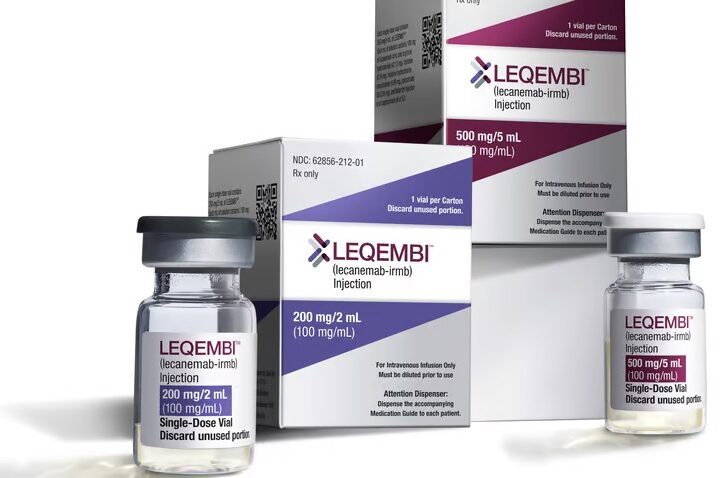After a successful trial, an FDA decision on Alzheimer’s drug candidate lecanemab is expected as soon as this week. Experts say we may be able to learn something about the drug’s risks from three recent deaths among trial participants.
Drugmakers Eisai and Biogen took their anti-amyloid Alzheimer’s treatment, lecanemab, to the finish line. By clearing amyloid plaques in the brains of people with mild-cognitive impairment and early Alzheimer’s, the drug slowed the rate of cognitive decline — by 0.45 points on an 18 point scale — igniting excitement from patient advocacy groups.
Eisai and Biogen sent out a lecanemab ”joint letter” calling the drug a “foundational game-changer” while noting possible side effects — including brain bleeds and brain swelling — associated with the drug.
“No barrier can be allowed to stand between our patients and a treatment that has a reasonable risk-benefit ratio and significantly reduces the causative pathology,” the letter concluded. But on the brink of an FDA decision as to whether this drug will soon hit the market, questions swirl about the exact nature of its “risk-benefit ratio”, especially since the 0.45 point slowing in cognitive decline is considered well below the threshold of a noticeable effect for patients.
According to the drugmakers, lecanemab’s Phase 3 clinical trials revealed no statistically significant difference between the number of deaths that occurred among its older adult trial participants with Alzheimer’s who were taking a placebo, and those who were receiving the actual drug. The company also didn’t explain an important confounding piece of data: despite slowing cognitive decline, the patients receiving lecanemab showed increased signs of brain shrinkage in both the Phase 2 and Phase 3 trials.
There’s a lot we don’t yet understand about the way monoclonal antibody drugs like lecanumab interact with the brain. And in the past three months, the media has reported on three separate deaths among recipients of the drug in this past fall’s clinical trial extension — probing what we can learn from these deaths about the drug, who it’s right for, and its risks.
Here’s a closer look about what we know about these three participant deaths, and why — if the trial found the drug both effective and safe — they are of interest now.
Three deaths during lecanemab’s trial extensions in fall of 2022
In late October 2022, news broke that an 80-year-old participant in the Phase 3 clinical trial for Alzheimer’s drug lecanemab had, in June, experienced an intracranial hemorrhage and died.
At the end of November, another story broke: Another lecanemab trial participant — a 65-year old woman — suffered a stroke and experienced brain swelling and bleeding. She died.
Both deaths occurred during lecanemab’s open-label extension, renewing concerns of the drug’s safety. And as the scientific and advocacy communities took in the news of positive results from the phase 3 trial, which indicated lecanemab is effective at slowing cognitive decline, there was more news: another death.
In December, the media reported on a third death — that of a 79-year-old woman in the lecanemab trial extension months earlier, following brain swelling, bleeding, and seizures. Unlike the two deaths already reported, this woman was not taking blood thinners. But independent experts still believe her death was also linked to the treatment.
In two of the three deaths during the lecanemab trial extension in 2022, the individuals who died were taking blood thinners, which are known to be a potentially dangerous combination with monoclonal antibody drugs like lecanemab and its predecessor, Alzheimer’s drug Aduhelm (aducanumab), which was approved by the FDA in 2021.
How many patients died during the lecanemab clinical trial overall?
These aren’t the only three deaths that occurred during the trial.
In the drug’s initial 18-month, Phase 3 trial period, 13 deaths occurred among 1,795 participants. That doesn’t mean, however, that any of these deaths were caused by the drug itself. For example, approximately half of them occurred among the placebo group. And as for those that occurred among people taking the drug, they may or may not have been linked to the drug’s effects.
In clinical trials involving older participants with medical comorbidities, such a number is not it isn’t out of the ordinary — and it is not an indication that a drug necessarily increases the risk of death.
“As a general comment on the unfortunate occurrences of participants in clinical trials who pass away-any evaluation of a death or deaths, must consider the age of the population and their other medical conditions as well as the length of the study,” Eisai said in a media statement.
After lecanemab’s 18-month Phase 3 trial period ended in March of 2021, the drug continued to be tested among trial participants in an open-label extension: Patients who were assigned either placebo or lecanemab during the Phase 3 trial could choose to take lecanemab in a continuing period of study, the data from which is still being collected and analyzed.
It was during this open-label extension period, where all participants were taking lecanemab, that these three aforementioned deaths occurred. According to Madhav Thambisetty, neurologist and senior clinical investigator at the National Institute of Aging, experts are watching these deaths — and the remainder of the two-year trial extension which will conclude this spring — closely because of what they may teach us about lecanemab’s specific risks.
“Any death of any patient enrolled in a clinical trial is unfortunate,” Thambisetty told Being Patient. “This report of a third death associated with lecanemab during the open-label extension of the trial further underscores the importance of fully understanding risk factors in individual patients that might help physicians identify those at greatest risk of life-threatening adverse events associated with this treatment.”
He also questioned why the information about these deaths in the open-label extension wasn’t presented alongside other data during the Alzheimer’s conference.
“It is in the best interests of patients that all safety data are analyzed in a timely manner and made publicly available at the earliest so that regulators, physicians and payors are empowered to make evidence-based decisions about the risks and benefits of any new treatment,” Thambisetty said.
Is lecanemab safe?
All medication labels carry warning of some degree of risk.
In the case of the first two deaths reported by the media and the drugmakers during the lecanemab extension, the patients were taking blood thinners, which are known to increase risk of an adverse event from monoclonal antibody drugs. In the third case, the 80-year-old woman with early Alzheimer’s had no other known comorbidities or other risk factors present to explain her stroke-like symptoms.
Adding to the curiosity around this third fatality report is that it was omitted from Eisai’s reporting at the late 2022 Clinical Trials on Alzheimer’s Disease Conference, where the drugmaker reported on lecanemab’s trial results.
Comparatively, lecanemab appears safer
than its predecessor, Aduhelm: One in five people
who received lecanemab experienced ARIA.
Among these cases — only 3.5 percent were symptomatic.
“This case was not reported as an ARIA-related death at CTAD because the information provided to Eisai to date does not indicate that ARIA occurred or that it was suspected to be linked to the death,” Eisai wrote in a statement, referring to amyloid-related imaging abnormalities, or brain swelling or bleeding events sometimes so small they are asymptomatic. (Their long-term impact is yet unknown.)
These ARIA are associated with the use of monoclonal antibodies targeting beta-amyloid. However, Eisai maintains it is not clear whether this patient experienced ARIA: “Unfortunately, as of yet, the investigator has not been provided access to the hospital records,” Eisai said in their statement.
In the aducanumab trials leading up to Aduhelm’s FDA approval for Alzheimer’s treatment in the summer of 2021, ARIA occurred in more than one third of patients receiving the high dose of the drug.
Comparatively, lecanemab appears safer than its predecessor: One in five people who received lecanemab experienced ARIA. Among these cases — only 3.5 percent were symptomatic.
These reactions occurred most often in participants who carried two copies of the ApoE4 gene, a gene mutation linked to Alzheimer’s risk.
APOE4, anticoagulants, and other risk factors for patients taking lecanemab
In the publication of their data and in-person conferences, lecanemab’s drugmakers have highlighted that carrying two copies of the APOE4 gene does confer “an especially high risk of life-threatening brain hemorrhage.”
Thambisetty believes that if the drug does receive FDA approval, physicians must account for risk factors like APOE4 before prescribing the drug to a patient.
Some researchers and clinicians Being Patient interviewed took an even stronger stance, saying that the risks are too great to justify the drug’s use. Karl Herrup, an Alzheimer’s researcher at the University of Pittsburgh, expressed concern about the long-term impact of ARIA for patients taking monoclonal antibody drugs for Alzheimer’s. “I would say to a patient group that I recommend against it,” Herrup told Being Patient.
APOE4 isn’t the only risk factor: Up to 80 percent of people with Alzheimer’s have a condition called cerebral amyloid angiopathy (CAA). In CAA, amyloid plaques crowd the brain’s blood vessels, replacing the muscles that normally surround them. Lecanemab and other anti-amyloid antibodies weaken the blood vessels by getting rid of these plaques. The blood vessels become weak and susceptible to hemorrhage.
People living with Alzheimer’s and CAA might have a higher risk of brain bleeds if they opt for a monoclonal antibody treatment like lecanemab.
In the middle of lecanemab’s Phase 3 trials, the drugmakers issued a revised study consent form that included a stronger warning for patients: Taking anticoagulants or blood-thinners along with lecanemab increased the risk of serious brain bleeds or death between estimated to be more than 1 in 100 people, but less than 5 in 100 people. Patients who were already enrolled in the clinical trials were to be asked whether or not they wanted to continue, given this additional risk.
According to third-party experts who reviewed the lecanemab death cases, anticoagulant use may have contributed to worsening of ARIA in the first two reported deaths from the open label-extension trial.
While Eisai acknowledged and investigated these deaths, they said in a statement that they did not believe they were linked to lecanemab — despite warning of the link during the consent process in the trial: “Both cases had significant comorbidities and risk factors including anticoagulation contributing to macrohemorrhage or death,” Eisai said in earlier statements. “Therefore, it is Eisai’s assessment that the deaths cannot be attributed to lecanemab.”
The difference between lecanemab and past trials
Unlike in previous Alzheimer’s trials, where only those among the healthiest 25 percent of people with Alzheimer’s disease might qualify, lecanemab trials welcomed participants with other medical comorbidities, such as hypertension, diabetes, obesity, hyperlipidemia, and heart disease. This is riskier for trial participants, as drug interactions with these comorbidities isn’t well known. It also leads to a more accurate representation of risk in a general population, ideally producing data that could save lives later.
At this point, however, it isn’t clear whether any of these factors increase the risk of developing complications during the course of lecanemab treatment. Instead, if the drug secures FDA approval and goes to market, it will be up to patients and their clinicians to be vigilant for signs of side effects and stay one step ahead through MRI scans and other risk mitigation measures.
The current deadline for an FDA decision on approval or rejection of the drug is this Friday, January 6, 2023.



